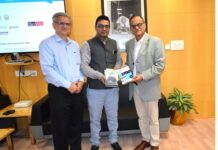New Delhi: The All India Syringes and Needles Manufacturers Association (AISNMA) has decided to voluntarily cap trade margins to maximum of 75 percent on ex-factory prices (including GST) latest by 26th January 2018.
The statement issued by the AISNMA mentioned that the decision is in the background of the various new stories of patients being overcharged and specially convened meeting with NPPA on 18th December 2017, wherein National Pharmaceutical Pricing Authority (NPPA) advised the syringe manufacturers to either voluntarily limit the margins and MRP or the government would have to step in to regulate them.
The decision to self regulate has been conveyed to all the domestic manufacturers through a letter by AISNMA and in the first ever step taken by any medical device manufacturing segment.
To address the serious issue of unreasonable huge margins charged by hospitals on medicines and consumables, the NPPA had earlier called for a meeting with the syringe manufacturers, where the NPPA chairman sought details of market dynamics, product categorization, margins in various market segments and sought suggestions from manufacturers.
As per the AISNMA, the NPPA had advised the syringe manufacturers that they could either voluntarily limit the trade margins on MRP or the government would have to step in to regulate them and cap prices.

































































